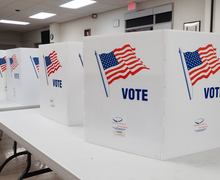Alumnus predicts Romney to win 2010 presidential election
Peter Brown, assistant director of the Quinnipiac University Polling Institution, spoke Monday, telling the audience that he expects Mitt Romney to beat President Obama in the 2012 election.
Elections expert Peter Brown told the audience Monday afternoon that if he had to bet on who would win the 2012 presidential election, he would put his money on Republican Mitt Romney.
Brown, assistant director of the Quinnipiac University Polling Institute and Syracuse University graduate, came to the Maxwell School of Citizenship and Public Affairs for a conversation on the 2012 election outlook. His lecture, ‘The 2012 Elections: One Year Out,’ was sponsored by the Maxwell School’s Campbell Public Affairs Institute.
‘No one knows more about the workings of parties and elections than Peter,’ said Robert McClure, a political science professor at Maxwell and personal friend of Brown. ‘Part of the reason we remain friends is because him and I are constantly betting on elections, and I assure you I never pay him enough.’
With the election 51 weeks away, Brown said President Barack Obama’s hopes for re-election rely on one sole factor: people’s opinions on the economy. He said he strongly believes unless problems escalate overseas involving terrorism or Iran within the next year, or the Supreme Court rules on the Arizona immigration laws before next November, the issue of the economy will dominate the 2012 election.
Obama’s future is unclear because he only has a 43 percent approval rating, and re-election will come down to whether people believe his policies worsened or stabilized the economy, Brown said. As in the case of all incumbent elections, people need to decide if Obama deserves a second term or if a challenger can do a better job.
‘Americans know for sure what they like and what they don’t like,’ Brown said. ‘And so with low job approval ratings one thing’s for sure — it is inevitable that the 2012 campaign will be the nastiest and dirtiest in recent history, with more money spent than ever before.’
With one year left until the elections, it is difficult to tell specifically what might happen, but general predictions can be made. Brown compared presidential elections to 400-meter races in the Olympics. As with the races, elections have a staggered start, in which it is unknown who is ahead until the final turn, or Labor Day.
Brown analyzed the Republican candidates who seem to challenge Obama, referring to most of them as ‘flavor of the month’ candidates that come and go but are unable to pass Romney, whose approval ratings are consistent with those of Obama. Texas Gov. Rick Perry is a poor debater and Herman Cain lacks both organization and money, both essential to sustain a campaign, Brown said.
These ‘flavor of the month’ candidates have flaws most voters are not thrilled with. For this reason, many people want the primary race to end so Republicans can stop clashing and instead save money to challenge Obama. With a long primary process, Brown said he believes Romney will not only win the primaries, but ultimately win the entire election.
‘Romney’s also got money,’ Brown said. ‘He ran in ’08, did a confident job and has supporters — about a quarter of Republicans right now.’
Republicans will have a sharper advantage over Democrats in 2012 than they did in 2008. Assuming they win the states Sen. John McCain (R-Ariz.) won in the last election, the Republicans only need swing states Ohio, Florida, Virginia, North Carolina and Indiana to win the election.
A win could be even easier considering the Pennsylvania Legislature, which has a Republican body, may be changing their electoral vote distribution, changing Pennsylvania to a red state.
Republicans have a further advantage because of congressional redistricting, as the states that lost delegation were generally democratic states such as New York and California.
The final key to Republican turnout is President Obama himself.
‘People are always more likely to vote against something than for something,’ Brown said. ‘So Obama and his policies are what will determine how Republicans will vote.’
Published on November 14, 2011 at 12:00 pm
Contact Marwa: meltagou@syr.edu | @marwaeltagouri





